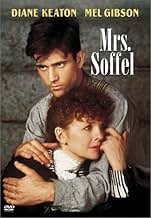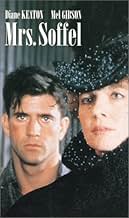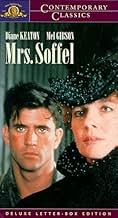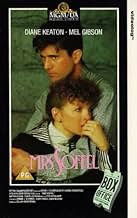NOTE IMDb
6,1/10
3,8 k
MA NOTE
Ajouter une intrigue dans votre langueDiane Keaton stars as a prison warden's wife who falls in love with a death row convict (Mel Gibson.) Believing he's innocent, she helps him and his convicted brother escape.Diane Keaton stars as a prison warden's wife who falls in love with a death row convict (Mel Gibson.) Believing he's innocent, she helps him and his convicted brother escape.Diane Keaton stars as a prison warden's wife who falls in love with a death row convict (Mel Gibson.) Believing he's innocent, she helps him and his convicted brother escape.
- Réalisation
- Scénario
- Casting principal
- Récompenses
- 3 nominations au total
Jennifer Dundas
- Margaret Soffel
- (as Jennie Dundas)
Avis à la une
Continuing my survey/reevaluation of Mel Gibson movies (well, somebody has to do it), I give this one 3 stars out of 4. If I were giving stars. Anyway...beautifully photographed, nicely-directed film of warden's wife (Diane Keaton) in 1901 Pittsburgh, in contact with death-row inmate brothers (Mel and Matthew Modine). Diane's in static marriage with warden Edward Herrmann and four kids; goes to death row to read Bible passages to cons...one in particular...! Mel's waiting' on a hangin' while the darling of local starry-eyed schoolgirls lamenting the handsome con's apparent fate. Diane and Mel strike sparks in this period romance. Film is slow-moving in first half, but stick with it.
This one was a nice surprise, I hadn't seen it when it first came out, so I rented it and enjoyed it thoroughly. Diane Keaton and Mel Gibson carry the day in this true tale of a wardens wife who falls for a prisoner. Matthew Modine does a fine job as Mel Gibsons brother, and the entire cast is fine. It's beautifully shot in Pittsburgh, and there is a languid quality about it that I found alluring. Well done all around.
Australian director Gillian Armstrong makes great films with strong women characters--her earlier Australian film "My brilliant career" being a perfect example. I watched "Mrs. Soffel" because of my admiration for Armstrong and found that "Mrs. Soffel" could not hold a candle to "My brilliant career" even though American actress Diane Keaton was admirable compared to the Australian actresses in the latter.
Armstrong had the talented Australian cinematographer Russel Boyd (who was responsible for the seminal works of Peter Weir and Bruce Beresford) once again to work with. While Armstrong and Boyd used justifiably darkened interior shots, I had problems seeing anything for long periods and had to rely on the soundtrack!
Armstrong loves to develop the female characters but leaves the male characters totally undeveloped (Mr Soffel and Jack Biddle). This is one reason I prefer the works of Weir and Beresford over Armstrong--even though her latent talent cannot be ignored. It is amazing to see Soffel's daughter getting equal or more prominence in the script than Mr Soffel towards the end.
Mel Gibson has made a name for himself by directing "Braveheart," but I give more credence to his acting phase in Australia ("Tim", "Mad Max", etc.). I am convinced that he is a director's actor--doing well with good directors. In "Mrs Soffel" Armstrong has evidently invested time with Diane Keaton, who carries the film. Gibson only lends support to her thanks more to the script than his acting capabilities.
Most of the fine tribe of Australian filmmakers of the Seventies have drifted to the US to become richer and gain international recognition--but their work in Australia in the Seventies remains unsurpassed.
Armstrong had the talented Australian cinematographer Russel Boyd (who was responsible for the seminal works of Peter Weir and Bruce Beresford) once again to work with. While Armstrong and Boyd used justifiably darkened interior shots, I had problems seeing anything for long periods and had to rely on the soundtrack!
Armstrong loves to develop the female characters but leaves the male characters totally undeveloped (Mr Soffel and Jack Biddle). This is one reason I prefer the works of Weir and Beresford over Armstrong--even though her latent talent cannot be ignored. It is amazing to see Soffel's daughter getting equal or more prominence in the script than Mr Soffel towards the end.
Mel Gibson has made a name for himself by directing "Braveheart," but I give more credence to his acting phase in Australia ("Tim", "Mad Max", etc.). I am convinced that he is a director's actor--doing well with good directors. In "Mrs Soffel" Armstrong has evidently invested time with Diane Keaton, who carries the film. Gibson only lends support to her thanks more to the script than his acting capabilities.
Most of the fine tribe of Australian filmmakers of the Seventies have drifted to the US to become richer and gain international recognition--but their work in Australia in the Seventies remains unsurpassed.
I skimmed the other comments before writing this one in case I'd missed something, but I think my initial lukewarm reaction to the film, which I saw on Turner Classic Movies, is the one I'll stick with.
I tuned into this movie because of Mel Gibson and also because I also happen to like Matthew Modine and Edward Hermann.
One commenter said something about the director liking strong female characters, but I didn't see Mrs. Soffel as being strong. Yes, she was unfortunate to be born at a time when women were basically seen as appendages to men. Her husband was not terribly understanding. As the movie opens, she is ill. Then she seems to undergo a miraculous recovery after being bedridden for months. My interpretation of this is that she had probably been suffering from a depressive episode. Yes, Mrs. Soffel is weak. Instead of doing something positive to stir her out of her situation, she falls prey to a criminal, who, admittedly, may not have been all bad. I suppose she had formed some sort of romantic image of Ed Biddle. And perhaps he also had a romantic streak. Both characters are shown to be not at all realistic in the way they see life.
I also found the film rather slow-moving, especially at the beginning. I almost stopped watching. Overall I found, though there were some touching emotional moments, especially at the end, that the movie lacked much of a plot and the characters lacked depth. With such a weak script, I think it would be difficult for me to see much for the actors to have worked with and cannot praise their performances. I wouldn't consider the movie to have been a complete waste of my time, but I couldn't really recommend it.
I tuned into this movie because of Mel Gibson and also because I also happen to like Matthew Modine and Edward Hermann.
One commenter said something about the director liking strong female characters, but I didn't see Mrs. Soffel as being strong. Yes, she was unfortunate to be born at a time when women were basically seen as appendages to men. Her husband was not terribly understanding. As the movie opens, she is ill. Then she seems to undergo a miraculous recovery after being bedridden for months. My interpretation of this is that she had probably been suffering from a depressive episode. Yes, Mrs. Soffel is weak. Instead of doing something positive to stir her out of her situation, she falls prey to a criminal, who, admittedly, may not have been all bad. I suppose she had formed some sort of romantic image of Ed Biddle. And perhaps he also had a romantic streak. Both characters are shown to be not at all realistic in the way they see life.
I also found the film rather slow-moving, especially at the beginning. I almost stopped watching. Overall I found, though there were some touching emotional moments, especially at the end, that the movie lacked much of a plot and the characters lacked depth. With such a weak script, I think it would be difficult for me to see much for the actors to have worked with and cannot praise their performances. I wouldn't consider the movie to have been a complete waste of my time, but I couldn't really recommend it.
(1984) Mrs. Soffel
DRAMA/ SOCIAL COMMENTARY
Starring Mel Gibson as prisoner, Ed Biddle and Diane Keaton as Kate Soffel that was supposedly based on fact. That happened in 1901 centering on those two characters unusual love affair. 'The Biddle Brothers' of Ed (Mel Gibson) and his brother, Jack (Mathew Modine) are sentenced to death because of another former criminal's testimony, which this guy claims he saw the brothers shoot and kill a defenseless store clerk. Except that these claims are made by a convict who already has a criminal record. And since out of the many robberies the Biddle Brothers had done together, their had never been a recorded incident where someone had been killed as a result of those robberies, so it's more probable than not that it had never happened. Anyways, Mrs. Soffel is married to the warden of this particular prison where all she does is hand out bibles and blankets to all the inmates. At first, she doesn't believe Ed (Gibson) when he tells her that him and his brother are innocent in regarding a clerk's death, but as a result of putting one her daughters into bed, her daughter informs her as a result of saving newspaper clippings that it's more probable than impossible that 'the brothers' may be innocent. Ed then strike up an emotional attraction with Mrs. Soffel since she's not getting any from her impotent husband anymore, which her marriage seems to be lifeless. As viewers witness they sleep in separate rooms and act like husband and wife in principal only. And it was during that time, she of course does her best to prevent this death penalty to occur. Although, I liked both Mel Gibson and Diane Keaton's performances, the story structure is somewhat dull and predictable. For it was obvious the film is clearly arguing against the death penalty, solely for this reason is that the accused might be innocent. And this message was mentioned like in the first half hour before it drags and prolongs the movie by showcasing the two characters of Keaton and Gibson becoming intimate with one another, something one can get from a Harlequin novel. And that is boring which forced me to use the fast forward button on many scenes while playing.
Starring Mel Gibson as prisoner, Ed Biddle and Diane Keaton as Kate Soffel that was supposedly based on fact. That happened in 1901 centering on those two characters unusual love affair. 'The Biddle Brothers' of Ed (Mel Gibson) and his brother, Jack (Mathew Modine) are sentenced to death because of another former criminal's testimony, which this guy claims he saw the brothers shoot and kill a defenseless store clerk. Except that these claims are made by a convict who already has a criminal record. And since out of the many robberies the Biddle Brothers had done together, their had never been a recorded incident where someone had been killed as a result of those robberies, so it's more probable than not that it had never happened. Anyways, Mrs. Soffel is married to the warden of this particular prison where all she does is hand out bibles and blankets to all the inmates. At first, she doesn't believe Ed (Gibson) when he tells her that him and his brother are innocent in regarding a clerk's death, but as a result of putting one her daughters into bed, her daughter informs her as a result of saving newspaper clippings that it's more probable than impossible that 'the brothers' may be innocent. Ed then strike up an emotional attraction with Mrs. Soffel since she's not getting any from her impotent husband anymore, which her marriage seems to be lifeless. As viewers witness they sleep in separate rooms and act like husband and wife in principal only. And it was during that time, she of course does her best to prevent this death penalty to occur. Although, I liked both Mel Gibson and Diane Keaton's performances, the story structure is somewhat dull and predictable. For it was obvious the film is clearly arguing against the death penalty, solely for this reason is that the accused might be innocent. And this message was mentioned like in the first half hour before it drags and prolongs the movie by showcasing the two characters of Keaton and Gibson becoming intimate with one another, something one can get from a Harlequin novel. And that is boring which forced me to use the fast forward button on many scenes while playing.
Le saviez-vous
- AnecdotesThe jail used in the movie is the actual Allegheny County Jail that figures in the story. Designed by noted architect Henry Hobson Richardson, built between 1884-1888, it served as a jail until 1995 and is now used by the juvenile and family sections of the Common Pleas Court.
- GaffesA toy electric train shown running around a Christmas tree is of a post-1950 design, as is the track. The train is based on 19th-century locomotive and passenger car prototypes, making it more plausible. However, toy electric trains that even remotely resembled the one shown did not exist by 1901.
- Citations
Kate Soffel: Don't you let them take me alive, Ed. Promise me. Promise me, Ed.
Ed Biddle: I won't, I promise. I won't let them take you.
- ConnexionsFeatured in The Making of 'Mrs. Soffel' (1984)
Meilleurs choix
Connectez-vous pour évaluer et suivre la liste de favoris afin de recevoir des recommandations personnalisées
Détails
Box-office
- Budget
- 11 000 000 $US (estimé)
- Montant brut aux États-Unis et au Canada
- 4 385 312 $US
- Week-end de sortie aux États-Unis et au Canada
- 86 280 $US
- 1 janv. 1985
- Montant brut mondial
- 4 385 312 $US
- Durée
- 1h 50min(110 min)
- Mixage
- Rapport de forme
- 1.85 : 1
Contribuer à cette page
Suggérer une modification ou ajouter du contenu manquant









































